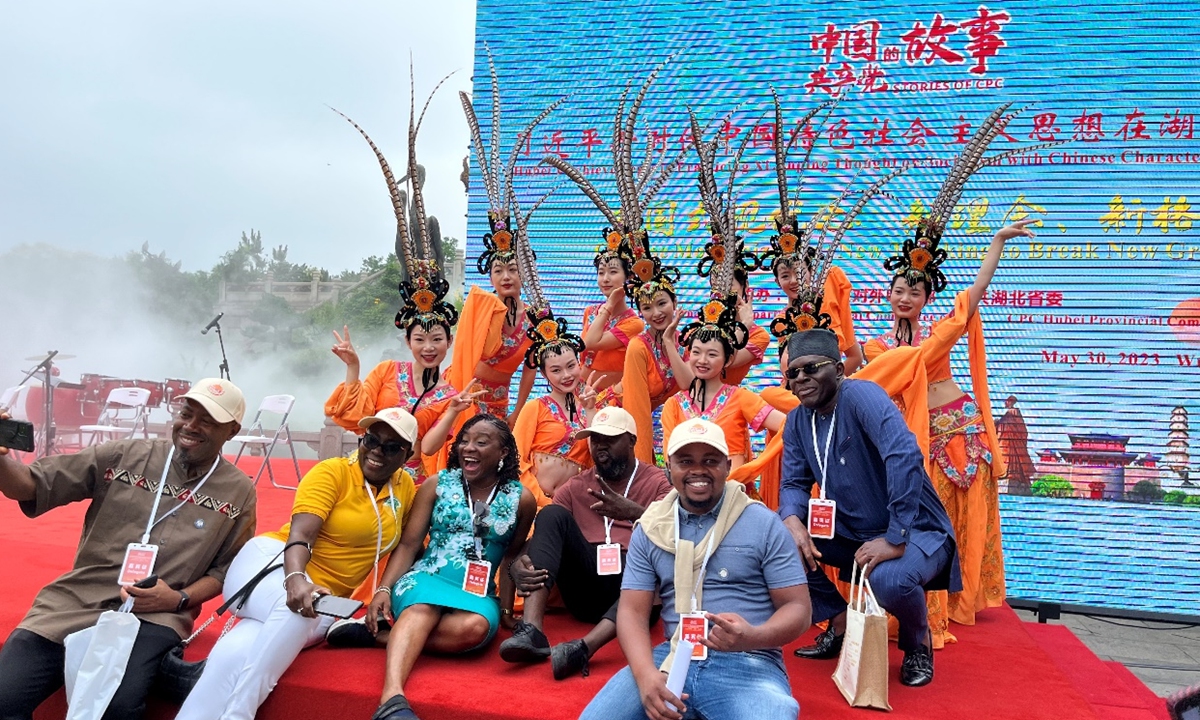
International guests at the Chinese Modernization : New Thinking to Break New Ground in Wuhan, Central China's Hubei Province on May 30, 2023. Photo: Zhang Changyue/GT
The path of Chinese modernization has inspired the world, as the first large-scale in-person political party activity after the COVID-19 epidemic kicked off in the city of Wuhan, Central China's Hubei Province on Tuesday.
Highly identifying with the path of Chinese modernization, representatives from foreign political parties, media organizations and think tanks said the successful implementation of the home-grown, different-from-West Chinese modernization gave them faith that developing the type of modernization most suited for their countries is possible.
A total of 177 foreign guests came to Wuhan in 11 delegations from 28 countries covering Europe, Asia, Africa and Latin America, with the highest rank at the minister level. Experts said the large number and high rank exceeded their expectations, showing foreign political party members' strong willingness and enthusiasm to strengthen talks with the Communist Party of China (CPC) on improving governance capacity.
Co-held by the International Department of the CPC Central Committee and the CPC Hubei Provincial Committee, the activity focused on introducing the concept and implementation of the path of Chinese Modernization, as well as the Party's self-purification, self-perfection, self-renewal and self-progression experience, which experts said was introduced to foreign political parties for the first time and reflected that the party has become more confident and open.
After learning from the rich experience of China over how to reduce poverty, boost the economy and develop political talks that are independent from and not reliant on the Western prescriptive democracy or political framework, we may develop democracy with Nigerian characteristics, Austin Maho, editor in chief of Nigeria's Daybreak News, told the Global Times on Tuesday, saying he'll take what he learned back home: learn from others' advanced experience but focus on the country's unique culture, tradition and historical background.
Multi-dimensional activities
The event, which will last for six days with more than 30 activities, is full of "soft and relaxing" arrangements to help foreign delegations know and understand China better.
During the thematic briefings on Tuesday, six ordinary Hubei residents shared their stories about making their hometowns better places. Cheng Ju, a woman born after the 1990s in the remote mountainous Dashi village, was one of them. Giving up glamorous engineering jobs in large cities after college graduation, she chose to be the village chief and led the villagers to build roads and grow traditional agricultural products to finally achieve poverty alleviation in the past 10 years.
On Tuesday, the foreign delegations visited Yellow Crane Tower, and the Wuhan National Research Center for Optoelectronics at the Huazhong University of Science and Technology, and boarded a cruise ship to enjoy night scenes of the Yangtze River.
From Wednesday, the foreign delegations will go in groups to the cities of Xiangyang, Yichang and Shiyan in Hubei, visiting places including Chinese new-energy vehicle producer BYD Auto, the Three Gorges Project of the Yangtze River and its shoreline remediation and restoration projects.
'You see and you believe'
"You cannot rely on Western media reports that tell about Wuhan being a disease city. When I told my family I'll come to Wuhan, they said don't go and were worried that Wuhan is a dangerous place.
"But I said I'll go and see first. And I'm here. I'm surprised to see Wuhan is safe, open, clean and beautiful, and is just as developed as Beijing. I'm happy to come here," Austin Maho told the Global Times at the Yellow Crane Tower.
"In Western countries, some media portray China as a backward place, but this is not what I saw after coming here," said Marie Pencikova, vice-chairwoman of the Communist Party of Bohemia and Moravia, who said China has made much progress in smart city construction and digitalization, urban greening and environmental cleanliness compared with 2015, when she came to China for the first time.
"The leadership of China is people-centered and knows what works for China. You rely on history, your traditions, harmony with nature and you are very modern and pragmatic. You cross the river by feeling the stones with a very clear vision: to eliminate poverty first then construct a prosperous society," Onwuama Udenta Udenta, a senior research fellow at the Nigeria-China Research Center, told the Global Times.
The foreign political parties said they highly identified with Chinese modernization as it is not only an important guarantee for China's tremendous achievements but can play a significant guiding rule in addressing some major global challenges.
Chinese modernization is a brand-new form of modernization focused on achieving common prosperity for all people, eradicating poverty, and promoting peaceful development, and this has provided a way to modernization options for Nepal, Agni Prasad Sapkota, former speaker of the House of Representatives in Nepal, told the Global Times.
Agni Prasad Sapkota pointed out that China is a world peace promoter and hoped China can protect more small and weak countries and uphold justice for them.
